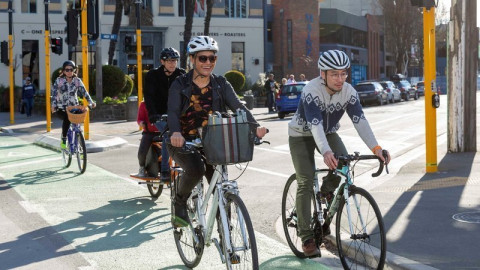
A discount scheme for bikes is needed to help more people get around more cheaply, be active, and reduce our emissions.
In December 2019 the government introduced a discount for public sector workers to buy E bikes. *1
That leaves out a lot of people. So we now want the government to be fair to everyone and implement a discount scheme that is open to ALL Kiwis AND includes both e-bikes and non e-bikes, and necessary equipment.
The Climate Commission report said ‘Meeting a zero-carbon target by 2050 requires a major transformation of the transport system’ and recommended’ investing in public, active and rapid transit’.*2
Two thirds of urban trips are less than 6 km, an easy 20-25 minute bike ride.
With more people on bikes, more often, is great for everyone. Cutting emissions, reducing congestion, improved health, saves money, lower medical costs.
Physical inactivity is estimated to cost NZ around $1.7 Billion/year (2015).*4
But the up front cost of a new bike is often a barrier.
To enable more people to be able to afford a bike, we want the government to help lower the cost by providing a discount.
Incentive schemes, have been shown to significantly increase the numbers using bikes to get around. And combining discount schemes with more cycle infrastructure, (as the government wants councils to provide), gives the best payback.
We need this to achieve lower emissions and healthier people
We want the Minister for Transport the Hon Michael Wood to introduce an incentive scheme that at a minimum includes a 20% rebate on E bikes and a 15% rebate on other bikes and equipment, (to a maximum amount).
With increased discounts for people with Community Services Cards, or a disability which requires a modified bike.
This will be cost effective, saving the government money and emissions.
• Low cost to government.
• More affordable than an EV
• Reduce congestion.
• Environmental - minuscule CO2 emissions from cycling *7 and less resources in the production of bikes than EV.
• Healthier - help people live more active lives – reducing the health costs of diseases such as, Diabetes 2, heart disease, some cancers.*6
• Estimated savings from each extra km cycled = $3.16/km (2015) *4
Supporting evidence
A Cycle scheme in the UK that provided discounts on bikes has been hugely successful.*5
• 61 percent of respondents didn’t cycle to work before signing up to the scheme and 70 percent classed themselves as novice or occasional cyclists.
• 76 percent of those surveyed said they wouldn’t have bought a bike if it hadn’t been for the savings available through the scheme.
• 87 percent of respondents noticed an improvement in health after starting to cycle to work.
A comprehensive study in Finland found that cycling to work for over 30 minutes a day was significantly associated reduced risk of developing type-two diabetes and as a consequence, lower mortality rates.
There is also consistent evidence in the literature that public investment in measures to facilitate increases in cycling is generally cost effective with high benefit-to-cost ratios, of often over five or ten to one.
There is also evidence that while some investments in cycling infrastructure can have significant payback they appear to work most effectively when combined with direct efforts to increase cycling activity such as through cycle to work schemes.
Sources:
*1 https://www.beehive.govt.nz/release/discounted-electric-bikes-offered-public-sector-workers
* 2 https://www.newsroom.co.nz/govt-cautiously-floats-transformative-transport-plans
*3 https://www.bikeradar.com/news/uks-cycle-to-work-scheme-hailed-as-a-success/
*5 https://socialvalueuk.org/wp-content/uploads/2016/09/impact-of-cycling-to-work-scheme.pdf
